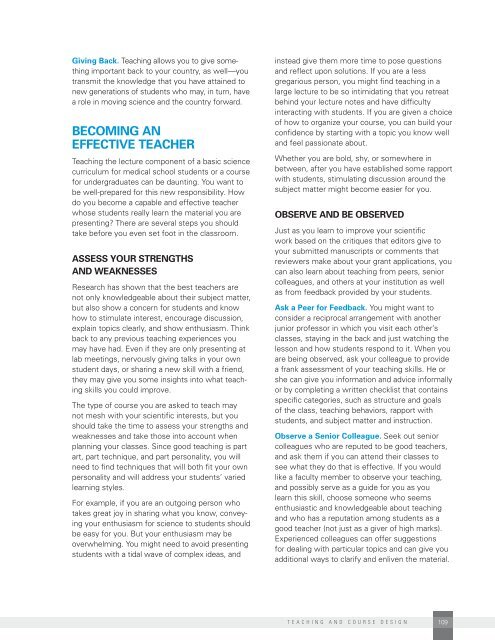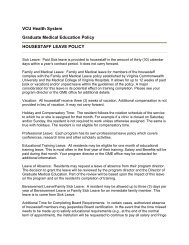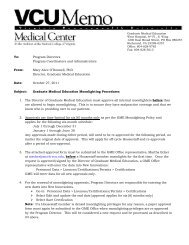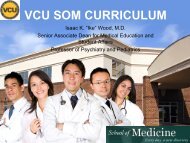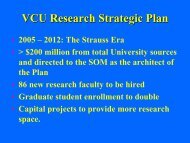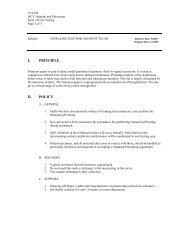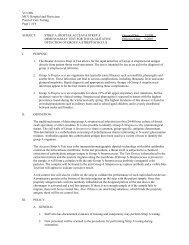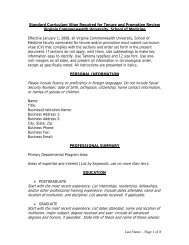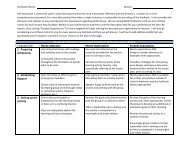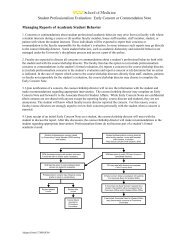the next generation <strong>of</strong> students (those whobecome scientists as well as those who go intoother fields), and you should take great personalsatisfaction from giving students the knowledge,insights, and enthusiasm they need to succeed aswell-educated members <strong>of</strong> society. These reasonsare explored in greater depth below.For me, the best thing <strong>of</strong> being a scientistis that one is capable <strong>of</strong> understanding informationthat might seem complex to others,and then one is also capable <strong>of</strong> translatingthis information to others to spread theknowledge.”Gilbert Brenes Comacho, Costa RicaReasons to TeachLove <strong>of</strong> Learning. Teaching completes thelearning cycle. It is a logical extension <strong>of</strong> your ownstudentship.A Strong Teaching Record Can Help YourResearch Career. If you are at a university thatvalues teaching, the fact that you are knowledgeableabout teaching will help you advance in yourenvironment. Taking on your fair share <strong>of</strong> theinstitution’s teaching load will help establish yourreputation as a valuable peer and colleague.Get to Know Potential Students for Your Lab.Teaching will likely give you access to students whomay want to join your lab. Teaching an importantclass extremely well will help spread your reputationamong the best and most serious students.Increase Science Literacy. Increasingly, scientistsare called upon to communicate effectively withthe public about complex and practical issuesranging from health policy to the philosophicaland real-world quandaries <strong>of</strong> crop engineering,embryonic stem cell research, or preservation <strong>of</strong>scarce resources. Delivering class-room instructionwill improve your communication skills. Also,by teaching students who will choose manycareers beyond science, you may influence futurepolicymakers, business leaders, corporate decisionmakersand others. Thus you will increase scienceliteracy and the general perception <strong>of</strong> science amongthose who affect how things move forward.Science and other Technical Fields Need toRetain Excellent Students. By adopting a teachingstyle that engages students, helps them becomeexcited about the discovery process, and createsin their imaginations the possibility <strong>of</strong> a rewardinglife in science, you will excite many more studentsabout pursuing scientific careers.Intellectual Growth. Ongoing interactions with newstudents will prompt you to rethink “the basics” inways that give you a deeper understanding <strong>of</strong> yourwork. Their questions may push you to acquire newskills and improve on existing ones, so that youyourself can extend your experimental reach.Increased Job Satisfaction. Your scientificexperiments and other aspects <strong>of</strong> laboratory workare not always going to go according to plan, and attimes you may become frustrated with the pace <strong>of</strong>research in your lab. Teaching can provide muchneededbalance that re-energizes you and can giveyou a sense <strong>of</strong> accomplishment. When you teach,you build the future, give individual students achance for better lives, and increase the community’sknowledge. It is <strong>of</strong>ten a much more sociableand direct experience than your progress throughlaboratory science.It is important to tell the history <strong>of</strong> certainexperiments and talk about the personalknowledge one has <strong>of</strong> some <strong>of</strong> the “actors”who made important contributions to, forinstance, molecular biology. Make the sciencewe teach alive. Foster enthusiasm. I usuallysay that I cannot teach any subject that doesnot interest or fascinate me. When I am fascinatedby the subject I am teaching, I manageto get fascination in the audience.”Alberto Kornblihtt, Argentina108 excellence everywhere
Giving Back. Teaching allows you to give somethingimportant back to your country, as well—youtransmit the knowledge that you have attained tonew generations <strong>of</strong> students who may, in turn, havea role in moving science and the country forward.BECOMING ANEFFECTIVE TEACHERTeaching the lecture component <strong>of</strong> a basic sciencecurriculum for medical school students or a coursefor undergraduates can be daunting. You want tobe well-prepared for this new responsibility. Howdo you become a capable and effective teacherwhose students really learn the material you arepresenting? There are several steps you shouldtake before you even set foot in the classroom.Assess Your Strengthsand WeaknessesResearch has shown that the best teachers arenot only knowledgeable about their subject matter,but also show a concern for students and knowhow to stimulate interest, encourage discussion,explain topics clearly, and show enthusiasm. Thinkback to any previous teaching experiences youmay have had. Even if they are only presenting atlab meetings, nervously giving talks in your ownstudent days, or sharing a new skill with a friend,they may give you some insights into what teachingskills you could improve.The type <strong>of</strong> course you are asked to teach maynot mesh with your scientific interests, but youshould take the time to assess your strengths andweaknesses and take those into account whenplanning your classes. Since good teaching is partart, part technique, and part personality, you willneed to find techniques that will both fit your ownpersonality and will address your students’ variedlearning styles.For example, if you are an outgoing person whotakes great joy in sharing what you know, conveyingyour enthusiasm for science to students shouldbe easy for you. But your enthusiasm may beoverwhelming. You might need to avoid presentingstudents with a tidal wave <strong>of</strong> complex ideas, andinstead give them more time to pose questionsand reflect upon solutions. If you are a lessgregarious person, you might find teaching in alarge lecture to be so intimidating that you retreatbehind your lecture notes and have difficultyinteracting with students. If you are given a choice<strong>of</strong> how to organize your course, you can build yourconfidence by starting with a topic you know welland feel passionate about.Whether you are bold, shy, or somewhere inbetween, after you have established some rapportwith students, stimulating discussion around thesubject matter might become easier for you.Observe and Be ObservedJust as you learn to improve your scientificwork based on the critiques that editors give toyour submitted manuscripts or comments thatreviewers make about your grant applications, youcan also learn about teaching from peers, seniorcolleagues, and others at your institution as wellas from feedback provided by your students.Ask a Peer for Feedback. You might want toconsider a reciprocal arrangement with anotherjunior pr<strong>of</strong>essor in which you visit each other’sclasses, staying in the back and just watching thelesson and how students respond to it. When youare being observed, ask your colleague to providea frank assessment <strong>of</strong> your teaching skills. He orshe can give you information and advice informallyor by completing a written checklist that containsspecific categories, such as structure and goals<strong>of</strong> the class, teaching behaviors, rapport withstudents, and subject matter and instruction.Observe a Senior Colleague. Seek out seniorcolleagues who are reputed to be good teachers,and ask them if you can attend their classes tosee what they do that is effective. If you wouldlike a faculty member to observe your teaching,and possibly serve as a guide for you as youlearn this skill, choose someone who seemsenthusiastic and knowledgeable about teachingand who has a reputation among students as agood teacher (not just as a giver <strong>of</strong> high marks).Experienced colleagues can <strong>of</strong>fer suggestionsfor dealing with particular topics and can give youadditional ways to clarify and enliven the material.teaching and course design109
- Page 3 and 4:
A R e s o u r c e f o r S c i e n t
- Page 5 and 6:
Table of ContentsVII119PrefaceChapt
- Page 7:
135 Chapter 10E x p a n d i n g Y o
- Page 15 and 16:
Q u e s t i o nq&aWhat Is a “Tenu
- Page 17:
preparing for immediate submission,
- Page 22 and 23:
Practicing the Talkn Practice your
- Page 24 and 25:
your one-on-one interviews you have
- Page 26 and 27:
If talking directly about money is
- Page 28 and 29:
When the institution responds and y
- Page 30 and 31:
equipment and supplies. Maintenance
- Page 32 and 33:
Q u e s t i o nq&aIs your instituti
- Page 34 and 35:
Working With Human SubjectsWhether
- Page 36 and 37:
RESPONSIBILITIES BEYONDTHE LABORATO
- Page 38 and 39:
UNDERSTANDING YOURINSTITUTION AND H
- Page 40:
Criteria for PromotionStructure of
- Page 45 and 46:
Q u e s t i o nWhat’s in a Name?q
- Page 47 and 48:
Screening ApplicantsWhen you review
- Page 50 and 51:
Interpersonal Skillsn How important
- Page 52 and 53:
Multinational Organizations are hir
- Page 54 and 55:
n If there is an office that handle
- Page 57 and 58:
n Seek funding and publish papers (
- Page 59 and 60:
In fact, even though you yourself h
- Page 61 and 62:
n Craft a statement that you feel c
- Page 63 and 64:
n When you delegate authority to so
- Page 65 and 66:
n Use only pens, preferably with wa
- Page 67 and 68: Strategy sessionsShould you decide
- Page 69 and 70: Finding Good Papers for Journal Clu
- Page 71 and 72: If possible, invite people in your
- Page 73 and 74: Q u e s t i o nq&aHow do I avoid po
- Page 75 and 76: The International Committee of Medi
- Page 77 and 78: Managing Conflictin the LabConflict
- Page 79 and 80: steps for dealing with conflictWhen
- Page 81 and 82: chapter 5managing your time“ Succ
- Page 83 and 84: Check your work: the 90-year though
- Page 85 and 86: n Make and keep appointments with y
- Page 87 and 88: n Help them seek advice without tak
- Page 89 and 90: FAMILY MATTERSMany scientists face
- Page 91 and 92: chapter 6project management“ We m
- Page 93 and 94: My project is to get a grant funded
- Page 95: ObjectivesObjectives are the end re
- Page 98 and 99: The key events schedule and the act
- Page 100 and 101: Microsoft Project, a program that s
- Page 102 and 103: Martin, Vivien. Managing Projects i
- Page 104 and 105: appendix II: Example of a Work Brea
- Page 106 and 107: appendix iv: Example of a Gantt Cha
- Page 108 and 109: e h i n d c l o s e d d o o r s :w
- Page 110 and 111: Who might be interested in supporti
- Page 112 and 113: Call your program officerProgram of
- Page 114 and 115: direct costs vs. indirect costsDire
- Page 116 and 117: RESOURCESAllen, Ernest M. “Why ar
- Page 120 and 121: Seek Feedback through a Formal Peer
- Page 122 and 123: Encouraging Student Questionsn Do n
- Page 124 and 125: Here are some ways you can help the
- Page 126 and 127: n Are there curriculum changes unde
- Page 128 and 129: a relaxed format for talking about
- Page 130 and 131: spend in preparing an effective cou
- Page 132 and 133: The Publishing ProcessTypes of Jour
- Page 134 and 135: A word about impact factorsThe impa
- Page 136 and 137: C r e a t i n g a n i n t e g r a t
- Page 138 and 139: may need to take the first author p
- Page 140 and 141: submitting image filesToday, most i
- Page 142 and 143: Submitting your Paper to Another Jo
- Page 144 and 145: RESOURCESDavis, Martha. Scientific
- Page 146 and 147: increase your impact as a scientist
- Page 148 and 149: Q u e s t i o nq&aHow do I communic
- Page 150 and 151: n Offer criticism and correction in
- Page 152 and 153: It is important to discuss career g
- Page 154 and 155: When Mentoring,Advisory, or Supervi
- Page 156 and 157: For researchers in developing count
- Page 158 and 159: n Is travel safe and convenient, or
- Page 160 and 161: n The expected contribution of each
- Page 162 and 163: Meetings. Set up systems to ensure
- Page 164 and 165: SPECIAL CHALLENGESFOR THE BEGINNING
- Page 166 and 167: e an important connection to future
- Page 168 and 169:
The invention of a new method or pr
- Page 170 and 171:
licensee, who can charge others for
- Page 172 and 173:
Most profound for developing countr
- Page 174 and 175:
Finally, the patents have been chal
- Page 176 and 177:
And, India benefited as a supplier
- Page 178 and 179:
paperwork involved in purchasing1.
- Page 180 and 181:
labeling mattersA case in point: In
- Page 182 and 183:
equipment, freeze-drying equipment,
- Page 184 and 185:
Responsibilityfor materialsIf an or
- Page 186 and 187:
Recent Improvementsin Materials Tra
- Page 188 and 189:
“Knowledge is power.” —Sir Fr
- Page 190 and 191:
MOUMemorandum of UnderstandingRFPRe
- Page 192 and 193:
notes continued182 excellence every
- Page 194:
notes continued184 excellence every


